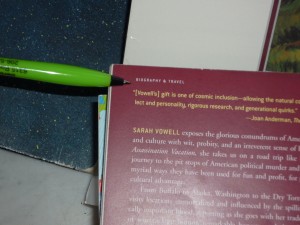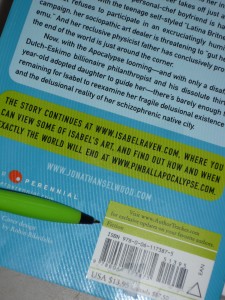
No, I’m not devoting today’s post to the resting habits of seagulls. I just thought that after all of the horrifying imagery we’ve all been seeing over the last 24 hours, a nice, soothing image wouldn’t be amiss today. (But if you’re itching to help out: both the Red Cross and Doctors without Borders can put donations to work helping earthquake victims right away.)
For those of you joining us mid-series, I’ve been spending the last few posts on an overview of how books currently get published in the United States. Not the astonishing pervasive fantasy that all a good writer has to do to get published is to write a book, but the actual logistics of what happens. The view from the trenches, as it were. So far, we’ve gone over how US-based publishing has changed over time; how fiction and nonfiction are marketed differently; why a writer needs an agent; the various methods of seeking representation, along with their pros and cons, and last time, what kinds of reactions an aspiring writer may reasonably expect following an attempt to approach an agent.
Is everyone fairly clear on all of those? If not, please feel free to post questions in via the comments functions — or, better yet, to seek out more detailed answers amongst the many and varied categories on the archive list on the lower right-hand side of this page.
Yes, yes, I know: I have been harping on the archives quite a bit over the last few posts, but I assure you, I have my reasons. The current series is intended to give those new to trying to get their work published — and anyone else who feels like reading it — a general view of how the process works, as opposed to my usually favored approach, the let’s-concentrate-on-this-one-small-aspect-for-a-week method of analysis. Both have their benefits, of course, but if you are looking for elucidation on any of the individual points I’m discussing here, chances are that you will find far more discussion than you ever dreamed in the archived posts.
So if delving into the archive list starts to feel like trying to catalogue the contents of Pandora’s box, well, don’t say that I didn’t warn you. Back we go to the general overview.
What a writer should do if an agent requests materials: paper or ether?
If a query or pitch is successful, an agent will typically ask the writer to send either the entire manuscript (rare), a specified number of pages from the beginning of the book (substantially more common), or, for nonfiction, the book proposal. Most of the time, this means that the agent is expecting to receive it as hard copy, sent by regular mail, so if the requesting agent does not specify, start printing.
Yes, even if you queried electronically; reading submissions in soft copy is still far from universal. If an agent prefers e-mailed submissions, he will tell you so when he requests the pages; that information is often included on the agency’s website’s submissions requirements list as well.
If an agent does prefer electronic submissions (and tells you so), send the requested pages as an attachment to an e-mail. Under no circumstances should you ever send a computer disk or CD-R with your book on it — it will be returned without being opened.
If you are planning to submit electronically, please be aware that unless a US-based agent specifically states otherwise, the attachment he has in mind is a document in MS Word. If you work on a Mac, make sure to send it as a Windows-friendly document and as .doc file; many agencies do not run recent enough versions of Word to read .docx files.
Why Word, as opposed to any of the many software programs out there professing to create professional-looking book pages? Word is what the major publishing houses use, that’s why. If the agent of your dreams is going to submit electronically to an editor, that’s how the editor would expect to receive it.
Occasionally, an agent will ask for attachments as rtf (rich text format), a version without the formatting bells and whistles that render documents hard to translate across word processing systems; if you don’t habitually work in Word, but send your document in rtf, a Word user should be able to open it. Some agents accept submissions in PDF format — especially those who choose to read submissions on a Kindle, rather than on a computer screen, as is becoming increasingly common — but it’s seldom preferred, as it’s hard to edit.
Because the human eye reads much more quickly on a backlit screen than on a printed page, it’s usually to the writer’s advantage to submit in hard copy, rather than electronically. It’s also more work for an agent to reject a paper copy, as opposed to the single action of hitting the DELETE key required to remove an e-submission from his life forever; that’s also true of mailed vs. e-mailed queries, incidentally. (For more on the pros and cons of paper vs. electronic submissions, please see the E-MAILED SUBMISSIONS and E-MAILING QUERIES categories on the list at right.)
However an agent has asked you to submit, though, do as he asks. In fact, if there is one inviolable rule to bear in mind while preparing a submission packet, it is surely send the agent precisely what he has asked you to send.
What a writer should do if an agent requests materials: demonstrating you can follow directions
Being hyper-literal often doesn’t serve an aspiring very well along the frequently perilous road to publication, but this is one time where it’s positively a boon. All too often, aspiring writers get so excited over an agent’s request that they forget the quality of the writing is not necessarily the only factor an agent weighs in deciding whether to represent a client. She’s also going to being paying attention to whether the submitter is good at doing what he’s asked to do.
So I reiterate: submit precisely what the agent asks you to send — and only what she asks you to submit.
What might that mean in practice, you ask? Well, if the agent asked to see the first 50 pages, send the first 50 pages — not the first 49, if a chapter happens to end there, or 55 if there’s a really exciting scene after page 50. If page 50 ends mid-sentence, so be it.
Getting the picture?
Why is it so very important to follow submission instructions exactly? The ability to follow directions to the letter tends to be a quality that agents LOVE to see in potential clients, since it implies the writers in question possess two skills absolutely essential to working well with an editor — no, make that three: an ability to listen or read well, a capacity for setting goals and meeting them, and a professional attitude.
So getting the contents of the submission packet right is monumentally important. So if you receive the request in the course of a pitch meeting, take the time to write down a list of what the agent is asking you to send. Read it back to him to make sure you caught everything. (Trust me, if you’re face-to-face with an agent who has just said yes to you, you won’t be thinking with your usual clarity.)
If the agent makes the request in writing, read the missive through several times, then sit down and make a list of what he’s asked you to send. Wait at least 24 hours before re-reading the communication to double-check that every requested item made it onto the list. THEN assemble your submission packet, checking off each element as you place it into the envelope or box.
Clever reader Tad came up with a brilliant extra level of security: after you have assembled the submission packet, hand it, your list, and a copy of the letter from the agent to someone you trust — a parent, a significant other, a best friend, or any other friendly, detail-oriented person you’re relatively certain isn’t harboring a secret desire to see you miserable — and ask that person to check that (a) the letter and the list correspond exactly and (b) you’ve included every necessary element in the packet.
Yes, it’s THAT vital to get it right.
Throughout the last few paragraphs, I’ve been sensing some confusion out there. “But Anne,” a few timid souls pipe up, “am I missing something here? How difficult could it possibly be to print up the number of pages the agent requests, place them in an envelope, and pop it in the mail? Are you saying that he might ask to see something other than the manuscript?”
Often, yes. There are also a couple of elements that any US-based agent will expect to see, whether or not he asks you to include them.
What might an agent ask you to submit — and what should you always send whether she asks for it or not
Since there is no industry-wide standardization of what precisely belongs in a submission packet, any given agent may ask for a different array — and you already know to send precisely what each asks you to send, right? However, the most commonly-requested elements are:
* The requested pages in standard manuscript format, unbound.
The most popular lengths to ask for are the first chapter, the first three chapters, the first 50 pages, the first 100 pages, and the entire manuscript. If you’re unfamiliar with the way a professional manuscript should look (hint: not like a published book, nor is it identical to a short story submission), please see the HOW TO FORMAT A BOOK MANUSCRIPT and STANDARD FORMAT ILLUSTRATED categories at right.
A few cautionary notes, just in case any of you are too eager to get that packet out the door to check the formatting posts: manuscripts absolutely must be double-spaced, in 12-point type (preferably Times, Times New Roman, or Courier), printed on only one side of the page with one-inch margins, and feature indented paragraphs. (No, business format is not proper here — for a full explanation why, please see the BUSINESS FORMAT VS INDENTED PARAGRAPHS category at right.)
* A synopsis.
For fiction, this is a description of the major twists and turns of the plot, told as vividly as possible. Remember what I said last time about every syllable you submit to an agent being a writing sample? Holds true for the synopsis, too. (For tips on how to pull this off in what is often an intimidatingly small number of pages, please see the HOW TO WRITE A REALLY GOOD SYNOPSIS category at right.)
For nonfiction, it’s a summary of the central question the book will address, why the question is important to answer, and a brief indication of what evidence you will use to bolster your arguments. (For an in-depth look at how to pull one of these together, please see HOW TO WRITE A NONFICTION SYNOPSIS category at right.)
* An author bio.
This is an extended version of the 1-paragraph description of your life, with emphasis upon your writing credentials, your education, and any experience that would lead an observer to regard you as an expert on the subject matter of your book. For a crash course on how to write one, please see the HOW TO WRITE AN AUTHOR BIO category. (Hey, I wasn’t kidding about there being a whole lot of elucidation on this site. If an agent asks you for something, chances are that I’ve written a two-week series on how to produce it.)
* The book proposal.
As I mentioned earlier in this series, book proposals are marketing packets used to sell nonfiction. For an explanation of what should go into it and how to put it together, please see the HOW TO WRITE A BOOK PROPOSAL category. (This is starting to read like the back of a greatest hits album, isn’t it?
* A marketing plan.
This request was unheard-of for novels until just a couple of years ago, but recently, the marketing plan has been enjoying a vogue. For fiction, it’s the same document as the similar section in the book proposal (and thus a description of how to write one may be found under the HOW TO WRITE A BOOK PROPOSAL category): a description the target audience for the book and how to reach them.
Bear in mind that what anyone who asks to see a marketing plan has in mind is what the AUTHOR will be doing to promote the book, not the publishing house’s efforts, so just saying, “I will make myself available to go on a book tour,” probably isn’t going to impress anybody. Think creatively: who is your target reader, and where do folks like that congregate?
Those are what an agent will probably ask to see. For tips on how to present these professionally, how to box them up, in what order they should be stacked, etc., please to see the HOW TO PUT TOGETHER A SUBMISSION PACKET category at right.
While I’m at it, here is a list of what she will almost certainly not mention in her request, but your submission will appear substantially more professional if you include:
* A cover letter thanking the agent for asking to see the requested materials and repeating the writer’s contact information.
I’m always astonished at how many aspiring writers just throw a manuscript into an envelope without even attempting any polite preliminaries. It’s rude — and, given how many queries an agency processes in any given week, it’s not a grand idea to assume that the person who opens your submission envelope (almost certainly the screener, Millicent, whom we met yesterday, not the agent herself), will instantly recall who you are. (For guidelines on how to construct this important missive, please see, you guessed it, the COVER LETTERS FOR SUBMISSIONS category at right.)
* A title page for your manuscript.
Again, most submitters omit this, but an already-established writer would never dream of submitting a manuscript anywhere without a title page, since a professional title page includes information absolutely vital to marketing the book: the book category, the word count, the title (of course), the author’s contact information. (For an explanation of all of these elements, how to put them together on a page, and illustrations of what a professionally-formatted title page looks like, please see the TITLE PAGES category on the list at right.)
* A stamped, self-addressed envelope (SASE).
As with queries, not including a SASE with a submission is generally considered an instant-rejection offense. While it’s classy to include a letter-sized SASE in case the agent wants to respond in writing, the SASE in a submission is an envelope or box labeled with your address and enough postage (stamps, not metered) to mail it back to you. (If that sounds complicated, don’t fret: you’ll find a complete explanation of how to handle the many permutations of SASE use under the SASE GUIDELINES category at right.)
Why do you need to include a SASE for your manuscript’s return? Well, unless the agent decides to sign you to a representation contract, she’s not going to hang onto your manuscript — and since not all agencies have recycling programs (yes, I know; it’s discouraging), those rejected pages are just going to land in the trash.
Confused? It wouldn’t be altogether surprising if you were: the logistics of submission are much more complex than the vast majority of aspiring writers realize. For a much fuller explanation of how to juggle all of these elements into a professional-looking submission package, check out the HOW TO PUT TOGETHER A SUBMISSION PACKET category at right.
Packaging the submission so it ends up in the right place
Since agencies receive many, many submissions, both requested and not, with every single mail delivery, it’s an excellent idea to write REQUESTED MATERIALS in great, big letters on the top of the envelope or box containing your submission packet. This will help ensure that your package ends up in the right pile on the right desk. As unsolicited manuscripts are almost universally rejected unread, the last thing in the world you want is for your requested materials to be mistaken for them, right?
For the same reason, if an agent has asked you to submit pages via e-mail, it’s prudent to include the words REQUESTED MATERIALS in the subject line of the e-mail. It’s very, very easy to delete an e-mail accidentally, after all. Better safe than sorry, I always say.
Oh, and before I forget, let me reiterate that grand old piece of traditional writerly advice from the first post in this series: never, ever send an agent — or anybody else, for that matter — your only copy of anything. To that, let me add Anne’s Axiom of Submission: never spend the money to ship anything to an agent overnight unless they specifically ask you to do so.
Contrary to popular opinion amongst aspiring writers, overnight shipping will not get your packet read any quicker than sending it by regular mail, so it’s just a waste of money. Within the US, the significantly less expensive Priority Mail will get it there within 2-3 business days, which is quite fast enough.
Assuming that at least some of you are still with me, I shall now move on to the single most-asked question amongst submitters everywhere:
Okay, now I’ve sent my submission packet. How soon will I hear back?
Well, let me put it this way: I wouldn’t advise holding your breath. Even if you are asked to submit a partial and an agent decides that she’d like to see the rest of the book, you’re probably not going to hear about it right away.
And right away in this context means within the next six weeks. You’ll save yourself a lot of heartache if you understand this: no matter how enthusiastically an agent solicited a manuscript, trust me, she will neither have cleared her schedule in anticipation of receiving your materials nor will drop everything to read it the instant it arrives.
Yes, really. Unless she knows that there are other agents competing to represent you (should you find yourself in that enviable position anytime soon, congratulations, and please see the WHAT IF MORE THAN ONE AGENT ASKS TO SEE MY MANUSCRIPT? category at right), she — or, more likely, her assistant — will place it in a pile along with all of the other submissions awaiting review.
As with query letters, the length of time an agency takes to make a decision on a manuscript varies wildly, but most of the time — are you sitting down? — it’s measured in months, not days or even weeks. Most agencies list their average turn-around times on their websites or in their agency guide listings, to alert aspiring writers to what can be an extended wait, but those estimates tend to be quite optimistic.
Why does it take so long, you wail? Well, as I said, quite a few manuscripts will have arrived before yours. If waiting in a queue seems unfair now, think about it again after an agent has had a manuscript for a month: how would you feel if one that arrived today were read before yours?
Another reason that turn-around times tend to be slow is — again, you might want to brace yourself — the agent who requested the materials is not usually the only, or even the first, person to read a submission.
Remember our pal Millicent from yesterday? Guess what her job entails after she finishes screening all of those query letters? That’s right: she’s usually the one deciding whether a submission makes the first cut; at some agencies, two Millicents have to agree that a manuscript is of publishable quality AND a good fit for the agency before the agent sees it.
I told you to brace yourself. Unfortunately, as long-time readers of this blog are already glumly aware, Millicents are trained to find reasons to reject manuscripts first and foremost, rather than reasons to accept them.
And no, in answer to what half of you just thought, she doesn’t do it just to be mean or because she hates literature. Since her job is to thin the number of submissions her boss will have to read (often in the agent’s spare time, rather than at work, incidentally: yet another reason that turn-around times tend to be slow), a good Millicent may reject as many as 90% of submissions before they get anywhere near the agent. (For a truly frightening look at some of the most common criteria she uses to thin the herd, you might want to check out the FIRST PAGES AGENTS DISLIKE or AGENCY SCREENERS’ PET PEEVES OF THE NOTORIOUS VARIETY categories at right. I warn you, however, these posts are not for the faint of heart.)
Even more unfortunately, submitters are seldom given concrete reasons for rejection any more. (For a thoroughly depressing explanation why, please see the FORM-LETTER REJECTIONS category at right.) This means, in practice, that an aspiring writer may not gain any useable revision information from the submission process at all.
I know; it’s awful. If I ran the universe, or even just the publishing industry, it would not be this way. Queriers and submitters alike would receive kindly-worded explanations of why Millicent decided to reject them. Public libraries would also be open 24 hours per day, staffed by magnificently well-read and well-paid staff more than willing to stock good self-published and print-on-demand books (as most US libraries currently will not, as a matter of policy), and hand out ice cream to every child departing with a checked-out book, in order to instill in wee ones the idea that the library is the best place ever.
Under my benevolent régime, schoolteachers would also be paid exceptionally well, every citizen could afford to buy a few books by promising new authors every week, and municipal fountains would flow freely with chocolate milk for all to enjoy. Truman Capote, Dorothy Parker, and Madame de Staël’s birthdays would be international holidays. And earthquakes would be permanently banned.
In case you may not have noticed, none of these delightful things is yet true, so I think it’s safe to assume that I don’t yet run the universe. Sorry about that.
Despite deviating sharply from what I personally would like to see happen at agencies, the submission process is far from impossible to navigate: remember, every year, hundreds of first-time authors impress agents enough to land representation contracts. But there is a reason that acquiring an agent is so often described in fishing terms: she landed a great agent, his agent is a great catch.
Sometimes they’re biting; sometimes they aren’t. Being aware of that going into the process can help a writer keep pushing forward.
Which is precisely what you need to keep doing while an agency is pondering your manuscript: keep your chin up, keep querying and submitting to other agents — and keep writing on your next book.
That’s the sane and sensible way for a savvy writer to make her way through this often intimidating and mysterious process — don’t put all of your proverbial eggs into a single basket, especially not one being toted by someone as professionally touchy as Millicent.
That way lies despair. Trust me on this one.
But it’s been weeks. Can’t I, you know, speed up the process a little?
In a word, no. In more words: whatever you do during what can be an extended wait to hear back about your manuscript, DO NOT pick up the phone and call the agent to demand what on earth could possibly be taking so long.
It will not get your submission read faster, and since it’s considered quite rude in the industry for a writer to try to rush a decision (interesting, considering that writers often have only a week or two to decide whether to accept an agency or publishing offer), it’s unlikely to make you any friends at the agency.
If it’s been more than twice the length of time the agent told you to expect (or twice the average time listed on the agency’s website or guide listing), you may send a POLITE e-mail or letter, asking for confirmation that the agency has received your submission packet and offering to send another — they do occasionally go astray — but that’s it. (For a fuller analysis of this situation and other slow turn-arounds, please see the WHY HAVEN’T I HEARD BACK YET? category at right.)
Wow, that ended on a down note, didn’t it? Aren’t you glad that included that nice, cheery picture up top, to perk us all up?
Next time, I shall delve into an inherently happier topic: what happens after an agent decides to represent a book. Keep pressing forward, everybody, and as always, keep up the good work!
















